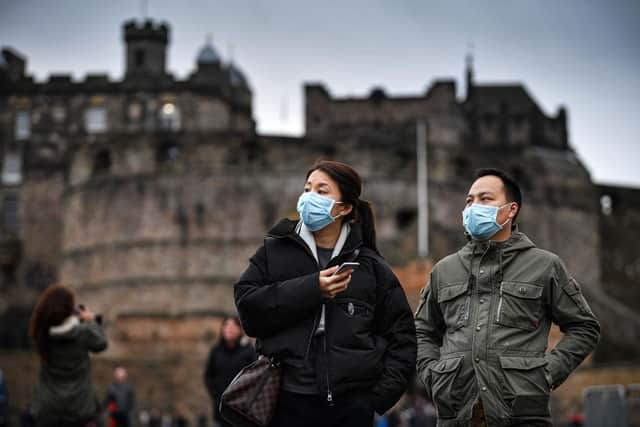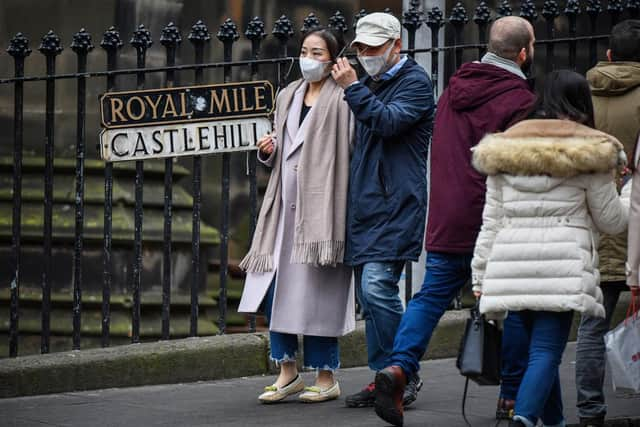Coronavirus in Scotland: latest update as number of people diagnosed with Covid-19 rises to 36
The number of confirmed cases of coronavirus in Scotland could rise "very rapidly" in the coming days, First Minister Nicola Sturgeon has warned.
There are now 456 cases confirmed across the UK, and there has been three fatalities.
More than 23,000 have been tested in the UK.


Advertisement
Hide AdAdvertisement
Hide AdGlobally, nearly 115,000 people have been infected with Covid-19 and there have been more than 4,000 fatalities.
Here’s what you need to know about coronavirus in Scotland – and how to prevent its spread.
Where in Scotland are the coronavirus cases?
The first case in Scotland was confirmed on Sunday 1 March and two more were confirmed on Wednesday 4 March.


On March 5 three new cases were confirmed.
Following the weekend there are now 36 confirmed cases of Covid-19 in Scotland.
The positive cases in Scotland are located in the following regions:
Ayrshire and Arran – 3
Borders – 2
Fife – 2
Forth Valley – 2
Grampian – 6
Greater Glasgow and Clyde – 5
Lanarkshire – 4
Lothian – 8
Shetland – 2
Tayside – 2
Total: 36
Will the number of cases in Scotland rise?
Addressing the current situation amid the outbreak of Covid-19, Ms Sturgeon said her Government is still working to delay the spread and reduce the impact on the public and the NHS.
Scottish Government ministers "will not hesitate" in taking measures to protect people from the disease, she said.
Speaking at First Minister's Questions, Ms Sturgeon said: "I think we all recognise and accept that it looks increasingly unlikely that we are going to be able to contain this outbreak indefinitely.
Advertisement
Hide AdAdvertisement
Hide Ad"So therefore it is likely that we will move into the delay phase of the virus and that may be reasonably soon, but that will be guided by the best scientific advice."
Describing the situation as "very serious", she added: "As of this morning we have six confirmed cases. I would expect that to rise - possibly very rapidly - in the days to come.
Deputy Chief Medical Officer Dr Jenny Harries said that "many thousands of people" would contract coronavirus as the disease continued to spread in the UK.
"We currently have relatively few cases here, which is why we are still in the containment phase," she told Sky News.
"Obviously we will have significant numbers in a way in which the country is not used to. This is the sort of thing that professionally we're trained for and very rarely see, almost in a professional lifetime.
"Large numbers of the population will become infected because it's a naive population, nobody has got antibodies to this virus currently.
We will see many thousands of people infected by coronavirus, that's what we're seeing in other countries and the important thing for us is to make sure that we manage those infections."
Where are people tested for coronavirus in Scotland?
There are screening laboratories in Glasgow and Edinburgh and discussions are ongoing about opening a further site in Tayside.
Advertisement
Hide AdAdvertisement
Hide AdShould a test result come back positive, the sample will be sent to Public Health England’s Colindale laboratory in London for a confirmatory test.
Nicola Sturgeon said she’s confident Scotland’s facilities would be able to cope with rising demand and that work is underway to identify recently retired NHS staff as part of “contingency plans to encourage and ask those who have recently retired from the National Health Service to come back if that is required".
Should I be worried?
The World Health Organisation (WHO) has declared coronavirus a public health emergency of international concern, and in response, the four UK Chief Medical Officers changed the UK risk level from low to moderate.
However, this doesn’t mean the risk to the public has increased – it simply means that governments and the health service need to increase their preparation in case of a more widespread outbreak.
The Scottish Government’s approach to the emergency is guided by the Chief Medical Officer, who is working closely with the WHO and the international community to monitor the situation.
How do I avoid catching coronavirus?
According to the NHS’ website, there are things you can do to help stop coronavirus spreading.
Regular hand-washing is the single most important action individuals can take in the fight against Covid-19.
Hand washing should be for 20 seconds, using soap and water or hand sanitiser.
Advertisement
Hide AdAdvertisement
Hide AdAvoid touching your eyes, nose and mouth with unwashed hands, and avoid close contact with people who are unwell.
Most people can continue to go to work, school and other public places.
You only need to stay away from public places (self-isolate) if advised to by the 111 online coronavirus service or a medical professional.
Nicola Sturgeon said: "If people follow the advice, if we ensure confirmed cases are isolated, that contacts are traced and given appropriate advice, and if the public follow the advice on hand (washing) and other personal hygiene, then we can continue to have a degree of success in stopping the spread from individual to individual, and it is important that we do that for as long as possible."The NHS advises carrying tissues with you and using them to catch your cough or sneeze, before binning the tissue and washing your hands or using sanitiser gel.
